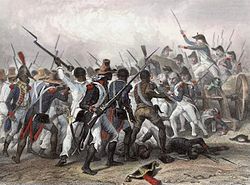
Back تمرد نات تيرنر Arabic Rebel·lió esclava de Nat Turner Catalan Εξέγερση των σκλάβων της Βιρτζίνια Greek Rebelión esclava de Nat Turner Spanish Révolte de Nat Turner French מרד נט טרנר HE Rebelião de Nat Turner Portuguese Nat Turner köle ayaklanması Turkish 特纳起义 Chinese
| Part of the origins of the American Civil War and North American slave revolts | |
 19th Century woodcut depiction of the Southampton Insurrection. | |
 Location of the rebellion in Southampton County, Virginia | |
| Date | August 21–23, 1831 |
|---|---|
| Duration | 3 days |
| Location | Southampton County, Virginia, United States |
| Coordinates | 36°46′12″N 77°09′40″W / 36.770°N 77.161°W |
| Also known as | Nat Turner's Rebellion Southampton Insurrection Nat Turner's Insurrection Nat Turner's Revolt |
| Type | Slave rebellion |
| Organized by | Nat Turner |
| Outcome | Rebellion suppressed Participants tried and executed or sold |
| Casualties | |
| 56 to 65 White men, women, and children | |
| 36 to 120 Black rebels and non-rebels | |
| Part of a series on |
| North American slave revolts |
|---|
 |
Nat Turner's Rebellion, historically known as the Southampton Insurrection, was a rebellion of enslaved Virginians that took place in Southampton County, Virginia, in August 1831.[1] Led by Nat Turner, the rebels killed between 55 and 65 White people, making it the deadliest slave revolt for white people in U.S. history.[2][3] The rebellion was effectively suppressed within a few days, at Belmont Plantation on the morning of August 23, but Turner survived in hiding for more than 30 days afterward.[4]
There was widespread fear amongst the White population in the aftermath of the rebellion. Militia and mobs killed as many as 120 enslaved people and free African Americans in retaliation.[5][6] After trials, the Commonwealth of Virginia executed 56 enslaved people accused of participating in the rebellion, including Turner himself; many Blacks who had not participated were also persecuted in the frenzy. Because Turner was educated and was a preacher, Southern state legislatures subsequently passed new laws prohibiting the education of enslaved people and free Blacks, restricting rights of assembly and other civil liberties for free Blacks, and requiring White ministers to be present at all worship services.[7]
Lonnie Bunch, director of the National Museum of African American History and Culture, said, "The Nat Turner rebellion is probably the most significant uprising in American history."[8]
- ^ Schwarz, Frederic D. "1831 Nat Turner's Rebellion," American Heritage, August/September 2006. Archived December 3, 2008, at the Wayback Machine "
- ^ "Nat Turner – Black History". History.com. Retrieved February 26, 2018.
- ^ Haltiwanger, John (September 21, 2017). "Nat Turner to Be Included on Monument in Richmond". Newsweek. Retrieved December 18, 2022.
- ^ Virginia Historic Landmarks Commission Staff (July 1973). "National Register of Historic Places Inventory/Nomination: Belmont" (PDF). Virginia Department of Historic Resources. Archived from the original (PDF) on December 27, 2016. Retrieved October 8, 2013.
- ^ Breen, Patrick H. (2015). The land shall be deluged in blood: a new history of the Nat Turner Revolt. New York, NY. ISBN 978-0-19-982800-5. OCLC 892895344.
{{cite book}}: CS1 maint: location missing publisher (link) "high estimates have been widely accepted in both academic and popular sources". - ^ Allmendinger, David F. (2014). Nat Turner and the rising in Southampton County. Baltimore. ISBN 978-1-4214-1480-5. OCLC 889812744.
{{cite book}}: CS1 maint: location missing publisher (link) Recent studies which review various estimates for the number of enslaved and free Blacks killed without trial, giving a range of from 23 killed to over 200 killed. - ^ Gray-White, Deborah; Bay, Mia; Martin, Waldo E. Jr. (2013). Freedom on my mind: A History of African Americans. New York: Bedford/St. Martin's, 2013. p. 225.
- ^ Trescott, Jacqueline (February 16, 2012). "Descendants of Va. family donate Nat Turner's Bible to museum". The Washington Post. Archived from the original on April 22, 2017. Retrieved March 28, 2017.
© MMXXIII Rich X Search. We shall prevail. All rights reserved. Rich X Search